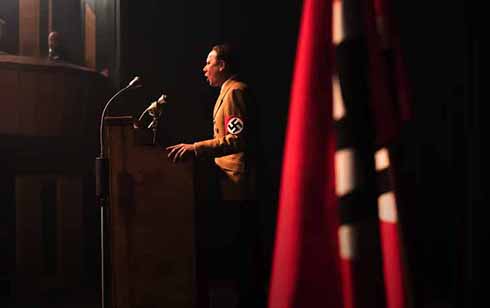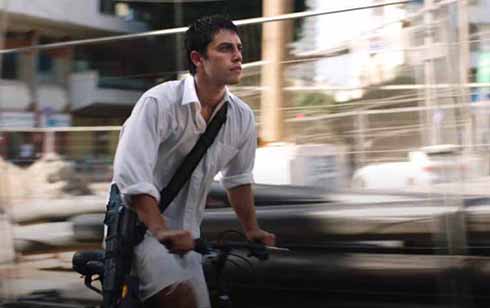Here is a selection of films from The International Jewish Film Festival 2024 which highlight political issues in Israel. The first takes us to the 1930s, the rise of the Nazis, migration to Palestine under the British rule, Shoshana (Director Michael Winterbottom). While the title focuses on a young Jewish woman, work as a journalist, daughter of a pioneer Zionist Socialist, the screenplay often moves away from her for quite some time, focusing more on the British police and the Haganah group, religious and literary inspiration, but underground terrorism, bombs and sabotage to make their presence felt. The film also focuses on the British police presence.
 The next film, Fuhrer and Seducer (Director, Joachim Lang) moves to Germany, the 1930s, the period of the war, a focus on the Minister for Propaganda, Joseph Goebbels. It looks at his personality, his ambitions, his snobbery, but also his relationship with women, various affairs, especially with the Czech actress, Lida Baarova. Then there is his marriage to his wife Magda, his infidelities, her reactions, and the number of their children. In this regard, Magda’s special friendship with Hitler is significant but also the fact that Hitler was aware of Goebbels’ liaisons, did not want them to undermine aspects of government, intervened that Goebbels and Magda would make a pact to stay together. The main focus of Goebbels’ activity is on his propaganda, the formulation of policies, pragmatic rather than principled, press, radio, cinema, his adapting them but always especially loyal to Hitler himself.
The next film, Fuhrer and Seducer (Director, Joachim Lang) moves to Germany, the 1930s, the period of the war, a focus on the Minister for Propaganda, Joseph Goebbels. It looks at his personality, his ambitions, his snobbery, but also his relationship with women, various affairs, especially with the Czech actress, Lida Baarova. Then there is his marriage to his wife Magda, his infidelities, her reactions, and the number of their children. In this regard, Magda’s special friendship with Hitler is significant but also the fact that Hitler was aware of Goebbels’ liaisons, did not want them to undermine aspects of government, intervened that Goebbels and Magda would make a pact to stay together. The main focus of Goebbels’ activity is on his propaganda, the formulation of policies, pragmatic rather than principled, press, radio, cinema, his adapting them but always especially loyal to Hitler himself.
With Neither Day nor Night, for non-Jewish audiences some homework is required into the nature of the Ashkenazi traditions, the prevalence of Ashkenazi Jews and the background of the Sephardic Jews. With both groups settling in Israel, there are cultural and religious differences and clashes between the majority and minority groups. This film focuses on a Sephardic community among the Ashkenazi. The devout father is a labourer, married with three children. The oldest, preparing for his bar mitzvah, is a keen student, bespectacled, articulate, of his class, expecting to go to the academic institution of his choice. However, he discovers that only one Sephardic student is acceptable to the Ashkenazi issues and a boy has been chosen because of his wealthy family.
 Then to more modern times and the action of The Vanishing Soldier (Director, Dani Rosenberg). Set over one day, we see a group of Israeli soldiers occupying Gaza and going into action, but one of them, Shlomo (Ido Tako) hesitating and then literally running away, seeing bodies lying dead on the streets, a Palestinian woman raising her hand in surrender, his taking an abandoned Palestinian car and driving to the border, running along the barbed wire, crossing back into Israel, running to his home. The audience wonders about his motivations, fear, the battles, his age, his family and relationships. As the film moves on, television news is seen and heard in the background, remarkably like what was heard in 2024. However, there is a significant twist. With Shlomo’s disappearance, the interpretation is that he has been kidnapped by Hamas and needs to be rescued, action escalating, public opinion, condemnation of the enemy. However, the reality is lament for a somewhat spoilt 18-year-old, being confronted with a serious situation but refusing to face it . . .
Then to more modern times and the action of The Vanishing Soldier (Director, Dani Rosenberg). Set over one day, we see a group of Israeli soldiers occupying Gaza and going into action, but one of them, Shlomo (Ido Tako) hesitating and then literally running away, seeing bodies lying dead on the streets, a Palestinian woman raising her hand in surrender, his taking an abandoned Palestinian car and driving to the border, running along the barbed wire, crossing back into Israel, running to his home. The audience wonders about his motivations, fear, the battles, his age, his family and relationships. As the film moves on, television news is seen and heard in the background, remarkably like what was heard in 2024. However, there is a significant twist. With Shlomo’s disappearance, the interpretation is that he has been kidnapped by Hamas and needs to be rescued, action escalating, public opinion, condemnation of the enemy. However, the reality is lament for a somewhat spoilt 18-year-old, being confronted with a serious situation but refusing to face it . . .
Then, Sabbath Queen (Director, Sandi Simcha Dubowski), an unexpected documentary, filming for almost 30 years as well as incorporating footage from further back.
The film is a challenge for a non-Jewish audience, in the sense of trying to appreciate the different perspectives and nuances of the Jewish and the biblical traditions, the roles of the rabbis, the influence on various communities. A non-Jewish audience may feel that they are observers to the action of this story.
At the centre is a significant character, Amichai Lau Lavie. His ancestry is Polish, grandfather a rabbi who did not desert his community but was sent to a concentration camp with his two sons, one helping the other to escape and surviving. They migrated to Israel, one son becoming the chief Rabbi in Israel, statesman and ambassador (seen with a number of significant world celebrities including the Dalai Lama and Pope John Paul II). He married an English woman and they had two sons, one becoming a rabbi, then, the other, Amichai whose story this is.
He identified as gay, something very difficult for his family. At age 28, he went to the US, found a place in the gay community, took on a persona to dramatise issues – that is a drag queen act of a Hungarian widow who is quite outspoken. But, there are a lot of sequences with Amachai himself, interviews at various stages, the late 90s, 2010 and several during the succeeding decade. He is frank in his explanations of himself, his Hungarian widow role, relationship, children through surrogacy and family life, his relationship with his brother and parents.
Dates
Melbourne: 27 Oct – 4 Dec
Sydney: 28 Oct – 5 Dec
Brisbane: 7 – 17 Nov
Canberra: 7 – 8 Dec
Adelaide: 7 – 17 Nov
Perth: 14 – 22 Dec
Hobart: 7 – 17 Nov